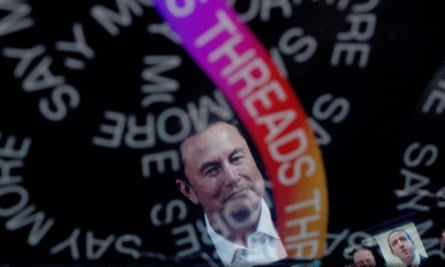
It feels as if the death of Twitter has been greatly exaggerated since Elon Musk took ownership of the company. Indeed, it’s not Musk, but Meta’s launch of Threads – which has 100 million-plus users in a matter of days – that could be the biggest threat to Twitter at present. Threads, though, appears to be a very different social media beast. For starters, Meta’s response to Twitter is accessed through your Instagram account, meaning you can automatically follow the accounts you already follow on Instagram. And though it looks quite similar to Twitter, with short text-based posts, it differs in key ways.
Friendly and news-free
Meta CEO Mark Zuckerberg hasn’t been shy in explaining where he thinks Twitter has failed, saying that the platform had underachieved due to the amount on hostility on Twitter. He’s said that his aim will be to grow Threads to be big but friendly. Is it possible to have a town square without everyone yelling at each other?
Instagram’s Adam Mosseri, meanwhile, said that news and politics will not be as prominent, which seems to go against the idea of such a site. It seems Meta wants to send the message straight away that this isn’t your live news source – which is arguably the one thing Twitter always got right until recently.
Despite this, politicians and news outlets are already joining Threads and beginning to work it into their social media routine. But as long as there is an algorithmically determined feed on the site, Meta controls how much of that content we see. Publications discovered that the hard way a few years ago when Facebook deprioritised news from its feeds. The company also recently gutted its own news teams.
Can Instagram influencers make good threads?
Since Threads is accessed with an Instagram account, people who have a large following on the photo-sharing app are converting that to a large following on Threads. But what works for a visual-based platform doesn’t translate well to a text-based one.
One of the jokes made about Musk buying Twitter is that he’s the world’s biggest reply guy trying desperately to be a poster. And in Threads, we’re now seeing what happens when influencers also suddenly have to learn how to post. The app already has a whole bunch of inspirational “live, laugh, love”-style quotes often found on Instagram. They look out of place, though, in a text-focused app where the cynical and comedic shine. This will probably change if the non-Instagram-famous posters build followings on Threads, but it’s not a great start.
Is Threads shredding Twitter?
There are signs Threads is at least starting to hit Twitter. Matthew Prince, the CEO of internet infrastructure company Cloudflare, said that Twitter’s traffic levels have been tanking since the start of this year, with the biggest dip in July. In addition to threatening to sue Meta over Threads, Musk’s posting through it all is also a sign it’s getting under his skin. After the app was launched, Musk tweeted: “Competition is fine, cheating is not.” (As my colleague Johana Bhuiyan reported, Twitter does not appear to have provided evidence of Meta having access to its IP or trade secrets.)
Love it, or leave it
One of the biggest hurdles for any new user on a social media platform is finding all the accounts you used to follow on other sites. If you leave Twitter, of course, you leave behind all the accounts you used to follow. So potentially one of the best features going for Threads will be its portability, something taken from Mastodon. Meta aims to incorporate the ActivityPub protocol into Threads to allow you to not only communicate with those on other fediverse servers (ie Mastodon users) but transfer your account and followers to services that allow you to port over.
A safe space … for advertising
Brands are flocking to Threads, even though Meta says it will no put adds on the platform for at least this year. One of the things that prompted advertisers to pause their advertising on Twitter was the shift in moderation and allowing far-right agitators back on to the platform. You can still see those on Threads – because they’ll go where the audience is – but might find their posts being more censored than they were on Twitter.
Which is a good thing, except that overall the experience feels much more corporatised than before. Twitter, brought to you by McDonald’s.
For all the talk about wanting a platform less toxic than Twitter, the overemphasis on moderation also has one big distinction from Twitter: no adult content. One of the big changes on the internet in the past few years was after adult content was banned on Tumblr, it moved to Twitter. Twitter had mostly turned a blind eye to it under the former administration, aside from shadow-banning accounts posting adult content (that is making people log in to see the posts, and making the accounts hard to find via search). None of that is allowed on Threads from the outset, just like Instagram.
The bigger discussion here is how long it would have remained on Twitter anyway. Several countries including the US, the UK and Australia have introduced online safety laws and regulation looking to put in more age verification and other restrictions on such sites, and at any time Apple could have turned to Twitter and threatened removal from the app store.
Maybe it’ll remain on Twitter, or one of the others will fill the gap. But Threads won’t be it.
after newsletter promotion
Missing features
Threads is still missing much of what makes Twitter Twitter. There are no hashtags to find like-minded communities. There’s no direct messaging, no desktop version, and no way to view only the feeds of people you follow. Many of these features are coming soon (except for DMs, according to Forbes) but will people stick around for that long to wait for it?
Clearview who?
Some of Meta’s rivals, including Jack Dorsey’s spin-off Bluesky, collect far less user data than Threads does, and Meta’s track record in what it does with that data should give us pause. Concerns over whether Threads can comply with EU data privacy rules is why the app hasn’t launched in the European Union yet. Many might make the calculation that if they’re already in the Zuckerverse, by using Instagram or Facebook, then what is one more app? But some people might pause and wonder if it’s worth giving Meta more data and making them even more powerful.
More Threads
Much digital ink has been spilled over the fastest-downloaded app in history. To cut through, here are a few key pieces, starting with an explainer I wrote and global technology editor Dan Milmo’s survey of the first serious threat to Twitter since Elon Musk took over. Finally, Kari Paul, in San Francisco, asks if Threads will flip the fortunes of a flailing Facebook. John Naughton, meanwhile, wonders where all the journalists and politcos will go if Threads does indeed manage to take down Twitter.
Finally, the Guardian’s media editor Jim Waterson has an insightful review of the new app and the internet landscape we’re now in, writing: “Threads’s launch might be just be another step in the disintegration of the social media scene of the 2010s and its rebirth as a more sanitised advertiser-friendly environment, rather than a messy free-for-all discussion.”
The wider TechScape




